「ちょっと猫をかぶってみました。」
= Chotto neko wo kabutte mimashita.
= I am “wearing a cat” for fun.
無断転載禁止(All rights reserved)
Hello, everyone!
First of all, I am very happy to announce that I fixed all the old lessons and audio files. Maggie Sensei is back on track. Yay!
I will keep making many lessons for my lovely Internet students! Again and again, thank you so much for all your support!
OK, I made this lesson three months ago, and now that Maggiesensei.com is back, I can finally post it!
Today I will teach you many many animal related Japanese expressions. (They will include insects and fish idioms as well.)
⭐️ animal = 動物 = doubutsu,
Ex. 動物園= doubutsuen = zoo
*insects /bugs = 昆虫 = konchuu /虫 = mushi
*birds = 鳥 = tori
*fish = 魚 = sakana
Many languages have rich animal-related idioms. Japanese is no different.
It is interesting that we have very similar proverbs but sometimes use very different animals. Every country, as you will see, has different images of animals.
While I won’t give you all the old proverbs that we don’t use much in conversation anymore, some of the following expressions are classic. Others are newer and very common in conversation.
Let’s start with dog expressions !! Because we are the best! 😀
↓
⭐️ 犬 = いぬ = inu = a dog 🐶
*犬猿の仲
= kenen no naka
= (The literal meaning) a dog-monkey relationship
= a bad relationship
(Note: I know that in English we say people fight like “cats and dogs“, but in Japanese people fight like “dogs and monkeys”!)
Ex. あの二人は犬猿の仲だ。
= Ano futari wa kenen no naka da.
= They don’t get along. / They have a cat-and-dog relationship
*犬死(を)する
= Inujini (wo) suru
= to die in vain
* 負け犬
= makeinu
= a loser
Ex.負け犬にはなりたくない。
= Makeinu ni wa naritakunai.
= I don’t want to become a loser.
*負け犬の遠吠え
= Make inu no touboe
= (the literal meaning) the Howl of the losing dogs
= Losers have bigger mouths.
*犬も歩けば棒にあたる
= Inu mo arukeba bou ni ataru.
= The dog that trots about finds a bone.
It originally means “ No matter what you attempt, tragedy may befall you” but it is used for something more positive nowadays.
“Good luck may come unexpectedly.“
*飼い犬に手を噛まれる
= Kaiinu ni te wo kamareru
= (The literal meaning) to have your hand bitten by your dog.
= I was betrayed by a person I was helping.
Ex. 彼にはあれだけよくしてあげたのに、これでは飼い犬に手を噛まれる様なものだ。
= Kare ni wa aredake yoku shiteageta noni koredewa kainu ni te wo kamareru you na monoda.
= I have been very nice to him but I feel I have been betrayed….
🐶: My version will be…
↓
飼い主に前足を踏まれる
= Kainushi ni maeashi wo fumareru
= to have my paw stepped on by my owner.
It occasionally happens. Don’t do that! 😛
*夫婦喧嘩は犬も食わぬ
= Fuufu genka wa inu mo kuwanu.
= (Literal meaning) Even a dog won’t eat a marital squabble.)
= One should not interfere in lovers’ quarrels.
Ex. もう喧嘩するのやめたら?「夫婦喧嘩は犬も食わぬ」って言うでしょ。
= Mou kenka suru no yametara? Fuufugenka wa inu mo kuwanutte iu desho.
= Stop fighting already! As we say “A marital squabble is worth nothing”
⭐️ 猫 = ねこ= neko = a cat 😺
*猫に小判
= Neko ni koban
= (The literal meaning) to give money to a cat
= Cast not pearls before swine.
Ex. 彼女にそんないいものをあげるなんて、猫に小判だ。
= Kanojo ni sonna ii mono wo agerunante, neko ni koban da.
= Giving her such a nice thing is such a waste. (She doesn’t deserve it.)
* Note : Similar to 豚に真珠 ( = Buta ni shinju ) which I will explain later.
*猫も杓子も (negative)
= nekomo shakushimo
= (The literal meaning) Even cats and rice ladles.
= everyone, anyone, every Tom, Dick and Harry.
Ex. 最近は、猫も杓子もスマホを持っている。
= Saikin wa neko mo shakushi mo sumaho wo motte iru.
= Every Tom, Dick and Harry has a smartphone now.
*猫の手も借りたい
= neko no te mo karitai
= (The literal meaning) to want to borrow even a cat paw
= Very busy and can use anybody’s help.
*猫の額
= neko no hitai
= narrow space
*猫ばば/ネコババ
= nekobaba
= (The literal meaning) cat poop or old cat woman
= To pocket the money or things you have found in secret.
*猫をかぶる
= neko wo kaburu
= (The literal meaning) to put on a cat
![]() Now see the picture above? I am putting on a cat ”ears”.
Now see the picture above? I am putting on a cat ”ears”.
But the real meaning is…
↓
To pretend to be innocent / to put on an innocence / to hide one’s claws (bad side)
*猫なで声 (negative)
= nekonadegoe
= (The literal meaning) The sweet sound that cats make when you pet them.
= in a coaxing voice tone
*借りてきた猫
= karitekita neko
= (The literal meaning) a borrowed cat
= a very quiet person, especially when behaving differently from their usual self.
Ex.うちの息子は家では腕白なのに学校に行くと借りてきた猫の様に大人しいらしい。
= Uchi no musuko wa ie dewa wanpaku nanoni gakkou ni iku to karitekita neko no you ni otonashii rashii.
= My son is naughty at home but he seems to be very quiet at school.
*猫かわいがりする
= Nekokawaigari suru
= to dote on someone
*猫舌
= nekojita
= (the literal translation) cat tongue
= not be able to eat hot food
Ex. 猫舌だから冷めるまで食べられません。
= Nekojita dakara sameru made taberaremasen.
= (This is too hot) I can’t eat it until it cools down.
⭐️ 豚 = ぶた = buta = a pig 🐷
*豚に真珠
= Buta ni shinju
= (The literal meaning ) to give pearls to a pig.
= Cast not pearls before swine.
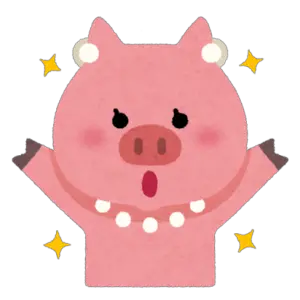
*ブタ箱
= butabako
= (slang) jail
Ex. そんなことをしたらブタ箱行きだ。
= Sonna koto wo shitara butabako ikita.
= If you (I) do such a thing, you (I) will be sent to jail.
⭐️馬 = うま = uma = a horse 🐴
*馬が合う
= uma ga au
= to have good chemistry, to get along with someone
*馬が合わない
= uma ga awanai
= to not get along with someone
*馬の骨 (negative)
= uma no hone
= (the literal translation) a horse bone
= a person with dubious origin, someone who we can’t tell where they came from
🔸 A set phrase :
どこの馬の骨かもわからない
= dokono uma no hone kamo wakaranai
= We don’t know where the person is coming from.
Ex. そんなどこの馬の骨かもわからないやつにうちの娘は嫁に行かせん!
= Sonna dokono uma no hone kamo wakaranai yatsu ni uchi no musume wa yome ni ikasen!
= I am not going to let my daughter married to a guy who we don’t know where he is coming from.
*天高く馬肥ゆる秋
= Tentakaku uma koyuru aki
= (The literal meaning) Autumn with the sky clear and blue, and horses growing stout
= It indicates autumn is a great season because the sky is clear and blue and we have more appetite.
Ex. 🙄「マギーまだ食べるの?」
= “Maggie mada taberu no?
= Are you still going to eat?
🐶 : 「だって、馬肥ゆる秋って言うじゃない。」
= “Datte Uma koyuru aki tte iujanai.
= ‘Cause we say “horses gaining weight in autumn” right?
*馬の耳に念仏
= Uma no mimi ni nenbutsu
= (The literal meaning) Buddhist chant into horse ears
= like water off a duck’s back.
= Not willing to listen to others’ advice or suggestion
*じゃじゃ馬
= jajauma
= restive horse
= rebellious women (towards men, husbands, upper-ranking people.)
*当て馬
= ateuma
= (The literal meaning) a stalling to check if a mare is in heat
= dummy
= (election) a spoiling candidate,
*馬車馬
= bashauma
= coach horse/ workhorse
Ex. 馬車馬の様に働く
= Bashauma no you ni hataraku
= (The literal meaning) to work like a horse to draw a carriage
= to work like a horse ( to work very hard.)
*馬子にも衣装
= Mago nimo ishou
= (The literal meaning) Even a packhorse driver would look good in nice clothes.
= Anybody can look good with nice clothes.
= Clothes/What you wear makes the man./ Fine feathers make a fine bird
⭐️牛 = うし= ushi = a cow 🐮
*牛に引かれて善光寺参り
= Ushi ni hikarete zenkouji mairi
= (The literal meaning) to be drawn by a cow and be led to Zenkouji (the name of a temple)
= to be led to something/somewhere great by chance by following someone.
*食べてすぐに寝ると牛になる (Supersitition)
= Tabete sugu ni neru to ushi ni naru
= (The literal meaning) If you sleep right after the meal, you will become a cow.
It could be because it is a bad manner or not good for digestion.
![]() Check more superstition in this lesson. 迷信
Check more superstition in this lesson. 迷信
*牛歩
= gyuuho
= to walk slowly, slow progress, snail’s pace
📝 Cultural Note :
There is a strategy called 牛歩戦略 ( = gyuuho senryaku) the chairmen of the opposition party walk slowly intentionally when they vote in the Diet to delay proceedings or not to pass some bills.
⭐️ 猿 = さる = saru = a monkey 🐵
*猿も木から落ちる
= Saru mo ki kara ochiru
= (The literal meaning) Even monkeys fall from trees.
= Even the cleverest man sometimes makes mistakes./ Anybody can make a mistake.
*猿まねをする (negative)
= sarumane wo suru
= to ape, to copycat
* 猿芝居 (negative)
= sarushibai
= a bad theatrical play
⭐️狸 = たぬき = tanuki = a Japanese raccoon dog
*タヌキ寝入り
= Tanuki neiri
= to pretend to be asleep
*タヌキおやじ (negative)
= tanuki oyaji
= a sly old man
*古狸 (negative)
= furudanuki
= an old timer, a wily old fox, a sly old man
*化け狸 (negative)
= bakedanuki
= a specter of Japanese raccoon dogs who disguise and deceive people
* 取らぬ狸の皮算用 (Proverb)
= Toranu tanuki no kawazanyou
= (The literal meaning) to calculate how much money you would make before you catch raccoon dog
=Don’t count your chickens before they are hatched.
Ex. 🐶 : 「私の写真集を出してお金がもうかったら海外旅行に行くの。」
“Watashi no shashinshuu wo dashite okanega moukattara kaigai ryokou ni ikuno.”
= If I publish my photo collections and make money, I will travel overseas.
😅 : 「そういうのを取らぬ狸のなんとやらっていうんだよ。」
= Souiu no wo Toranu tanuki no nantoyaratte iundayo.
= That is how we say “Count the chickens before something.” you know.
📝 Cultural note : Have you seen some 狸 ( = tanuki) raccoon dog “信楽 = Shigaraki” porcelain dolls like this?
If you travel around Japan, you may encounter this figure here and there.
They are thought to attract fortune,
* the hat → to protect from unexpected disaster
* big eyes → to be attentive and to make the right decision
* sake bottle →to be a person of virtue
* smile → to be friendly towards people
* big tummy →to have a calmness and boldness
* money bag → fortune
* accounting book→trust
* big tail →to end things properly
⭐️ 狐 = きつね = kitsune = a fox 🦊
*狐につままれたような顔
= Kitsune ni tumamareta you na kao
= to look/ feel baffled, bewildered
*狐の嫁入り
= Kitsune no yomeiri
= (The literal meaning) Fox’s Wedding
= The sun shower (when rain falls while the sun is shining)
*キツネ色
= Kitsune iro
= golden brown
Note : You see/hear this word often when you cook.
Ex. 肉をキツネ色になるまで焼いて下さい。
= Niku wo kitsune iro ni yaite kudasai.
= to grill until golden brown
*狐と狸の化かし合い
= Kitsune to Tanuki no bakashiai.
= to outfox each other (When sly people are trying to trick each other.)
📝 Culture note :
Raccoon dogs, foxes, rabbits, turtles, and monkeys are pretty common animals in Japanese folktales.
Because of the old folktales, Japanese raccoon dogs have the reputation of being mischievous. Foxes are thought to be sly. They both deceive people by shape-shifting into a human or other animals. Sometimes they disguise themselves as human beings by putting a leaf on top of their heads or transforming a leaf into money, This apparently deceives people, etc.
Have you ever read Japanese folktales or stories for children? Many animals have important roles in the stories.
If you have a chance, you should read some of the following stories.
☆桃太郎 = Momotarou → 犬 ( = inu) a dog, 猿 ( = saru) monkey, 雉 ( = kiji), Japanese pheasant
☆浦島太郎 = Urashima Taro → 亀 ( = kame) turtle
☆猿蟹合戦 = Saru kani gassen → 猿 ( = saru) monkey, 蟹 ( = kani) a crab
☆因幡の白兎 = Inaba no shirousagi → 兎 ( = usagi) a rabbit
☆鶴の恩返し = Tsuru no ongaeshi → 鶴 ( = tsuru) a crane
☆かちかち山 = kachikachi yama →狸 ( = tanuki) a raccoon dog, 兎 ( = usagi) a rabbit
☆花さかじいさん = Hanasaka jiisan →犬 ( = inu) a dog
☆舌きりすずめ = shitakiri suzume → 雀 ( = suzume) a sparrow
☆ごんぎつね = gongitsune → 狐 ( = kitsune) a fox
☆手袋を買いに = Tebukuro wo kaini → 狐 ( = kitsune) a fox
⭐️ パンダ = panda = a panda 🐼
*客寄せパンダ (usually negative)
= Kyakuyose panda
= (The literal meaning) crowd gathering panda
= crowd puller, someone/something to draw customers’ attention
⭐️ 兎= うさぎ= usagi = a rabbit 🐇
![]() ★野うさぎ= nousagi = a hare
★野うさぎ= nousagi = a hare
*二兎を追う者は一兎も得ず (proverb)
= Nito wo ou mono wa itto mo ezu
= (The literal meaning) If you run after two hares, you will catch neither
= He who runs after two hares will catch neither.
⭐️ 鼠= ねずみ= nezumi = a mouse, a rat 🐀
*ネズミ算式に増える
= Nezumisan shiki ni fueru
= grow exponentially, to multiply like rats
*袋のネズミ
= fukuro no nezumi
=(The literal meaning) a rat (a mouse) in a bag
= be trapped, nowhere to escape
*ネズミ捕り
= nezumi tori
= (The literal meaning) a mousetrap
= Police speed trap
Ex. 今、あそこの大通りでネズミ捕りをしているから気をつけて。
= Ima soko no oodoori de nezumitori wo shiteiru kara ki wo tsukete.
= Be careful, the police are setting up a speed trap on that big street now.
⭐️ 狼= おおかみ/オオカミ= ookami = a wolf 🐺
*男はみんな狼だ。(Cliche)
= Otoko wa minna ookami da.
= Be careful with men. They are all wolves.
*送りオオカミ
= Okuri ookami
= A man who offers a woman a ride home and attacks her on the way.
*狼少年 / オオカミ少年
= Ookami shounen
= (The literal translation) a wolf-boy
= From Aesop’s story “The Boy Who Cried Wolf”.
You use this word to refer to someone who always lying.
Ex. そんなに嘘ばかりつくとオオカミ少年みたいに誰も信じてくれなくなるよ。
= Sonnani uso bakari tsukuto “Ookami shounen” mitai ni dare mo shinjite kurenaku naruyo.
= If you always lying, you will end up like “The Boy Who Cried Wolf” and nobody will believe you.
⭐️ 虎 = とら = tora = a tiger 🐯
*虎穴に入らずんば虎子を得ず (proverb)
= koketsu ni hairazunba koji wo ezu
= Nothing venture, nothing win (Nothing ventured, nothing gained.)
*虎の威を借る狐 (proverb)
= Tora no i wo karu kitsune
= (the literal meaning) a fox in tiger’s clothing
=the donkey in the lion’s skin/ to be under the shelter of someone powerful
*虎の子
= Tora no ko
= (the literal meaning) a tiger cub
= Something precious, money, or something precious that you have kept carefully
*虎の巻
= Tora no maki
= (the literal meaning) a scroll of tiger
= a teacher’s tutorial book, solution book, bible for certain subjects.
⭐️ いたち/イタチ = itachi = a weasel
*いたちごっこ
= itachigokko
= (The literal meaning ) play weasel
= vicious circle
⭐️ 蛇= へび= hebi = a sneak 🐍
*蛇の道は蛇
= Ja no michi wa hebi
= (The literal meaning) a (little) snake knows the trench where a big snake goes
= The wolf knows what the ill beast thinks. / Set a thief to catch a thief.
*蛇の生殺し
= Hebi no namagoroshi
= (The literal meaning) to kill a snake in a halfway
= to leave someone in limbo
*蛇足
= Dasoku
= make an unnecessary addition, redundant
*やぶ蛇= やぶへび (薮蛇)= yabuhebi
(From a proverb :
↓
*薮をつついて蛇を出す
= Yabu wo tsutuite hebi wo dasu
= (The literal translation) to let the snake come out from the bush by poking the bush.
= to do something unnecessary and end up causing trouble. (Let a sleeping dog lie./ Don’t stir up a hornet’s nest.)
Ex. マギー先生に宿題が多いと文句を言いにいったら逆にヤブヘビで宿題が倍になった
= Maggie sensei ni shukudai ga ooi to monku wo iini ittara gyaku ni yabuhebi de shukudai ga bai ni natta.
= I went to Maggie sensei to complain we had too much homework and I ended up getting double the amount of homework. (Let a sleeping dog lie.)
⭐️ 鳥 = とり = tori = a bird 🐧
*鳥肌
= Torihada
= goosebumps
Ex. 鳥肌が立つ
= torihada ga tatsu
= to get goosebumps
It used to be used only in negative situations but nowadays, it is used in a good way.
Ex. 鳥肌もの (colloquial)
= Torihada mono
= Things that gives you goosebumps (in a good or bad way.)
*立つ鳥あとをにごさず
= Tatsutori ato wo nigosazu
= (The literal meaning) “Birds leave a place clean.”
= When you leave someplace, do not leave a mess.
*一石二鳥
= Isseki nichou
= kill two birds with one stone.
*かごの鳥
= Kago no tori
=(the literal meaning) caged bird
= refers to a person who is trapped in a place with no freedom
⭐️からす / カラス (烏、鴉)= karasu = a crow 🐦⬛
*からすの行水
= Karasu no gyouzui
= a quick bath
*からすの足跡
= Karasu no ashiato
= (The literal meaning) footprints of crows
= crow’s feet (wrinkles around eye area)
⭐️つばめ/ツバメ(燕)= tsubame = swallow
*(若い)つばめ/ツバ
= (wakai) tsubame
= a young male lover
⭐️ 鶴= つる= tsuru = a crane
*掃き溜めに鶴
= Hakidame ni tsuru
= (The literal meaning) a crane in dust
=A jewel in a dunghill.
Note 1) : 鶴 ( = tsuru) a crane, is a symbol of long life
*鶴は千年、亀は万年
= Tsuru wa sennen kame wa mannen
= Cranes live for 1, 000 years and turtles live for 10, 000 years.
Note 2) : Pictures of cranes are often used for happy occasions.
Also, 折り鶴 ( = orizuru) folded cranes are made when we wish for sick people’s recovery or wish for peace.
(Related lesson: 労る ( = Itawarru) In this lesson, I will show you how to make a paper crane.)
⭐️ 鷹 = たか = taka = a hawk 🦅
⭐️ 鳶 = とび/とんび = tobi / tonbi = a kite
*能ある鷹はつめを隠す
= Nou aru taka wa tsume wo kakusu.
= (The literal meaning) “a skilled hawk hides its talons”
= Wise men keep their talents in reserve (The real talented person doesn’t show off.)
*鳶が鷹を産む
= Tonbi ga taka wo umu
= (The literal meaning) A kite breeds a hawk.
= It’s a case of an ordinary parent producing a superior child.
*鳶に油揚げをさらわれる
= Tonbi ni abura(a)ge wo sarawareru
= (the literal meaning) to have fried tofu snatched by a kite.
= to have something valuable or caring about snatched away from before one’s eyes.
Ex. どうしたの?鳶に油揚げさらわれた様な顔をして。
= Doushitano? Tonbi ni abura(a)ge sarawareta you na kao wo shite.
= What’s wrong? You look like “a kite snatched away your friend tofu!”
⭐️ こうもり/コウモリ (蝙蝠) = koumori = a bat 🦇
*こうもり傘 = koumorigasa = a black umbrella (old fashioned)
*こうもりのような人
= koumori no you na hito
= (The literal meaning) a person who is like a bat.
= A person who tries to please everybody. a person who gets on with both sides
⭐️雀 = すずめ = suzume = a sparrow
*すずめの涙
= Suzume no namida
= (The literal meaning) Tear of sparrow
= A small amount of money, chicken feed, a mere
Ex. これだけ働いてもすずめの涙ほどのお金しかもらえない。
= Koredake hataraitemo suzume no namida hodo no okane shika moraenai.
= Even though I work this hard, I only get a small sum of money.
⭐️ 鴨 = かも = kamo = a canard 🦆
*鴨 (カモ)= kamo = an easy target, victim, a person who has been exploited
*鴨 (カモ)になる
= kamo ni naru
= to be an easy target, to be easily deceived by ~ , to be exploited
Ex. 彼女は悪徳業者のいいカモになっている。
=Kanojo wa akutokugyousha no iikamo ni natteiru.
= She has been an easy target of the wicked dealer. (She has been exploited by the wicked dealer.)
*カモる (slang)
= kamoru
= to deceive someone
![]() (passive form)
(passive form)
*カモられる (slang)
= kamorareru
= to be deceived by someone
*鴨がねぎ背負って来る
= Kamo ga negi wo shotte kuru
= (The literal meaning) A canard/duck carries a green onion on its back.
Note : We often use green onion = 葱 = negi – to cook everything in a pot.
So if a duck comes carrying green onion on its back, it will be very convenient.)
![]() Along comes a sucker just begging to be parted from his money …
Along comes a sucker just begging to be parted from his money …
![]() casual contraction : かもねぎ ( = kamonegi)
casual contraction : かもねぎ ( = kamonegi)
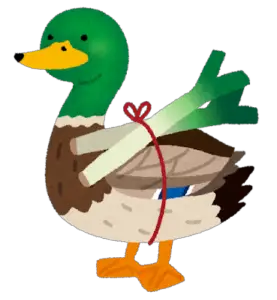
⭐️ 鳩 = はと = hato = pigeon, dove
*鳩が豆鉄砲を食ったような顔
= Hato ga mamedeppou wo kutta you na kao
= to look dumbfounded
Note : 豆鉄砲= peashooter, a gun loaded with beans (peas)
*******
⭐️Insects :
⭐️ 虫 = むし= mushi = insects, bug
*虫の知らせ
= Mushi no shirase
= guts feeling, premonition
*虫が好かない
= Mushi ga sukanai
= not to like someone, can’t take someone
Ex. あの人はどうも虫が好かない
= Ano hito wa doumo mushi ga sukanai.
= For some reason, I don’t like that person(him/her) so much.
*(悪い)虫がつく
= (Warui) mushi ga tsuku
= (The literal meaning) to get infested with insects
= to have an unfavorable lover
Ex. 娘に悪い虫がつかないか心配だ。
= Musume ni warui mushi ga tsukanai ka shinpai da.
= I’m worried that my daughter gets involved with some bad guy.
*虫の息
= Mushi no iki
= (The literal meaning) insect breath
= to be dying, to breathe faintly
*虫の居所が悪い
= Mushi no idokoro ga warui
= (The literal meaning) the place where the insects are bad
= to be in a bad mood
Ex. 今日、マギーは虫の居所が悪そうだから近づかない方がいいよ。
= Kyou Maggie wa mushi no idokoro ga warusou dakara chikazukanai hou ga iiyo.
= You should stay away from Maggie today because she seems to be in a bad mood.
*虫がよい/いい
= Mushi ga yoi / ii
= take too much for granted, selfish, having nerve
Ex. 週休3日で高いお給料がもらえる仕事?そんな虫のいい話はないよ。
= Shuukuu mikka de takai okyuuryou ga moraeru shigoto? Sonna mushi no iihanashi wa naiyo.
= Well paid three day weekend job? You are asking for too much. (There is no way to find such a nice job.)
![]() variation :
variation :
虫がよすぎる
= mushiga yosugiru
= asking for too much, to take advantage of something too much
Ex. お金が欲しいときだけ実家に帰るなんて虫がよすぎる。
= Okane ga hoshii toki dake jikka ni kaeru nante mushiga yosugiru.
= It is selfish of you to go visit your parents’ house only when you need money.
*蓼食う虫も好き好き
= Datekuu mushi mo sukizuki
= (The literal meaning) There is even an insect that likes to eat knotweed (which is very bitter.)
= Everyone has his own taste.
*飛んで火にいる夏の虫
= Tonde hi ni iru natsu no mushi
= Like moths to flame./ To rush to one’s doom,
*虫も殺さぬ顔をして…
= Mushi mo korosanu kao wo shite
= (The literal meaning) to have a face that doesn’t look like killing even a bug.
= very innocent, wouldn’t even hurt a fly
Ex. 彼女は虫も殺さぬ顔をしてひどいことをする。
= Kanojo wa mushi mo korosanu kao wo shite hidoi koto wo suru.
= She looks so innocent but does horrible things.
⭐️ 蜂 = はち/ハチ = hachi = a bee 🐝
*泣きっ面に蜂
= Nakittsura ni hachi
= (The literal meaning) to have a bee sting on a crying face.
= Adding insult to injury./ Rub salt in someone’s wound
*蜂の巣をつついたよう
= Hachi no su wo tsutuita you
= (The literal meaning) like poking (stirring up) the honeycombs
= like a madhouse
Ex.蜂の巣をつついたような騒ぎだ。
= Hachi no su wo tsutuita you na sawagi da.
= to be thrown into a total disaster/chaos
*働き蜂
= Hatarakibachi
= (The literla meaning) a worker bee
= a person who is always working.
⭐️ 蛙 = かえる = kaeru = a frog 🐸
*蛙の子は蛙
= Kaeru no ko wa kaeru
= (The literal meaning) The frog’s child is a frog
= Like father, like son
It usually has a negative connotation.
If the father is an ordinary man, his children will be the same way
We also say 蛙 = かわず= kawazu= a frog, in old days.
*井の中のかわず
= Ino naka no kawazu
= (The literal meaning) a frog in a well
=the frog in the well who does not know the ocean
=a person who does not know much of the world
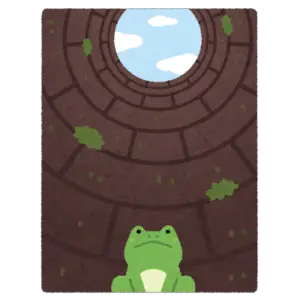
⭐️すっぽん= suppon= Chinese softshell turtle
*月とすっぽん
= tsuki to suppon
= (The literal meaning) The moon and a Chinese softshell turtle
= to be as different as day and night / beyond comparison.
(When you compare two different things)
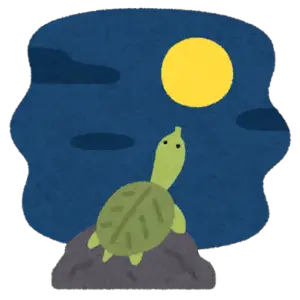
⭐️ 魚 = さかな = sakana = fish 🐟
*死んだ魚の様な目
= Shinda sakana no youna me
= like dead fish eyes
*逃がした魚は大きい
= Nigashita sakana wa ookii
= (The literal meaning) A fish that you let escape seems bigger than it is
= Regret magnifies the loss/ The one that got away is always bigger
*雑魚 (negative)
= zako
= (The literal meaning) small fish, trash fish, coarse fish
= nobody, a not important person, a lower ranking people
Ex. 彼は私みたいな雑魚は相手にしてくれない。
= Kare wa watashi mitai na zako wa aite ni shite kurenai.
= He ignores a little person like me.
*雑魚寝する
= Zako ne suru
= Many people squeeze into one room to sleep, sleeping together in a huddle
Ex. 今日、マギーのうちに泊まっていい?
= Kyou Maggie no uchi ni tomatte ii?
= May I stay at your house, Maggie?
🐶 いいよ。でもみんなも家に来るから雑魚寝だよ。
= Iiyo, demo minna mo uchi ni kuru kara zakone dayo.
= Sure. But everybody is coming over so we are going to squeeze in and sleep in the same room.
*水を得た魚
= Mizu wo eta sakana
= (the literal meaning) The fish in the water
= to be in one’s element, to feel happy and relaxed when you are doing something you really like doing.
Ex. 公園でマギーは水を得た魚のように走り回った。
= Kouen de Maggie wa mizu wo eta sakana no you ni hashiri mawatta.
= Maggie is in her element running around the park.
⭐️ 金魚 = きんぎょ = kingyo = goldfish
*金魚のふん (negative)
= kingyo no fun
= (The literal meaning) goldfish poop
= a person who follows someone everywhere they go or what they do, hanger-on
Ex. あいつは部長の行くところならどこでも金魚のふんみたいについて行く。
= Aitsu wa buchou no iku tokoro nara dokodemo kingyo no fun mitai ni tsuite iku.
= He (That guy) follows everywhere the department manager goes.
⭐️ 鯉 = こい= koi = a carp
*まな板の(上の)鯉
= Manaita no(ue no) koi
= (The literal meaning) a carp on the cutting board
=to be in a situation that you can’t escape or be in a position where you cannot do anything. / My fate is sealed. / My hands are tied.
Ex. もう「まな板の鯉」状態だ。(Colloquial)
= Mou “manaita no koi” jyoutai da.
= My hands are tied/ I am in a place where I can’t do anything about it.
Note : When you use a proverb or old saying in conversation, we often add 状態 ( = joutai) condition in conversation.
⭐️ 鯛 = たい = tai = sea bream
*腐っても鯛
= Kusatte mo tai
= (The literal meaning) Even if it’s rotten, sea bream is sea bream.
Note : For Japanese people, 鯛 (=tai) is a very expensive fish and we used to eat it only on happy occasions. Since 鯛 (= tai) sea bream is valuable, even if it’s rotten their value doesn’t change much.
= It may not be what it once was, but it is still first-class.
= high-class people keep their quality no matter how their situation changes.
*海老で鯛を釣る= Ebi de tai wo tsuru.
= (The literal meaning) Throw in a shrimp and pull out a sea bream
=Throw in a shrimp and pull out a whale / Use a sprat to catch a mackerel
= to get something much more valuable or huge profit with a small investment, effort, or price as a bait.
Note : Casual contraction :
![]() エビタイ= ebitai (colloquial)
エビタイ= ebitai (colloquial)
Ex. エビタイになっちゃってごめんね。
= Ebitai ni nacchatte gomenne.
= I am sorry that I got this nice thing although I just gave you something small. (It ended up unfair for you.)
⭐️鯖 = さば = saba = chub mackerel
= saba wo yomu
= to fudge a number or numbers or to fudge one’s age.
⭐️ 貝 = かい = kai = shellfish 🐚
*貝のように口を閉ざす
= Kai no you ni kuchi wo tozasu
= (The literal meaning) to close your mouth like a shellfish
= to clam up / to keep silent
******
It is not a real animal but a Disney character
⭐️ ダンボ = danbo= Dumbo
* 耳がダンボになる
= Mimi ga danbo ni naru
= to prick up one’s ears and listen to someone attentively
Ex. 隣の人がうわさ話をしていて思わず耳がダンボになっちゃった。
= Tonari no hito ga uwasabanashi wo shiteite omowazu mimi ga danbo ni nacchatta.
= I pricked up my ears when I was eavesdropping when the next table people were gossiping.
***********
⭐️For those who want to learn more:
Typical animal sound
動物の鳴き声 = doubutsu no nakigoe = animal call
*犬= inu = a dog
→ワン ( = wan) / ワンワン ( = wanwan)
(In my case, ブヒブヒ = buhibuhi 🐷 🤭)
*子犬 = koinu = a puppy
→クンクン ( = kunkun)
*猫 = neko = a cat
→ニャー( = nyaa) / ニャーニャー ( = nyaanyaa)、ニャンニャン ( = nyannyan)、ミャーミャー ( = myaamyaa)
*ねずみ = nezumi = a mouse
→チュー( = chu)/ チューチュー ( = chuuchuu)
*豚= buta = a pig
*狐 = kitsune = a fox
→コンコン = konkon
*牛 = ushi = a cow
→モー ( = moo) / モーモー ( = moo mooo)
*羊 = hitsuji = a sheep
→メー ( = mee)/ メーメー ( = meemee)
*ヤギ = yagi = a goat
→メー ( = mee)/メーメー ( = meemee)
*ライオン = raion = a lion
→ガオー( = gaoo)
*馬 = uma = a horse
→ヒヒーン ( = hihiiin )
running sound パカパカ ( = pakapaka)
*鶏 = niwatori = a chicken
→コケコッコー ( = kokekkou) , ココココ ( = kokokoko )
*ひよこ = hiyoko
→ピヨピヨ ( = piyopiyo)
*鳥 = tori = a bird
→ピーピー ( = piipii)
*雀 = suzume
→チュンチュン ( = chunchun)
*からす = karasu = a crow
→カーカー・カアカア( = kaakaa)
 マギー先生より= Maggie Sensei yori = From Maggie Sensei
マギー先生より= Maggie Sensei yori = From Maggie Sensei
“猫をかぶる”のも疲れたのでそろそろ犬に戻ります。
= neko wo kaburu no mo tsukareta node sorosoro inu ni modorimasu.
= I am getting tired of “wearing a cat” so I will be a dog again.
***
Will you be my Patron?
I appreciate your support! サポートありがとう!

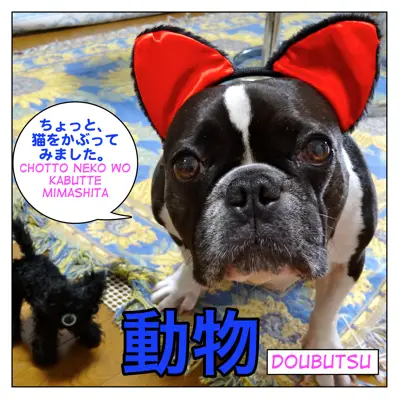
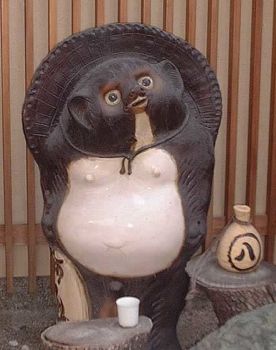
20 Comments
Hi, Maggie sensei! You’re awesome.
I want to ask you if 雌豹の目 is an expression and what would be its meaning? Thank you very much.
Hi Bere,
雌豹(or 女豹) is often used to describe a strong, aggressive and sexy woman.
So the way she looks is bold and sexy.
そんんな面白い授業を作ってくれてありがとうございます。今以後あなたは私の気に入る先生になる。
ありがとう、Sara!
これからSaraのお気に入りの先生になれたらうれしいです。
とても面白かったレッスンです!いくつかの表現がゲームによく出てくるし、いい勉強になりました!虫の居所が悪いとか、猫をかぶるなど
@らわ
こんにちは、らわ! 元気でしたか?
ゲームで日本語も勉強できますね!!らわはどんなゲームをしているのかなあ。
Thank you so much for compiling this! I came across the expression どごの馬の骨 in a comic today and had no idea what it meant. Now not only do I know but I found a big list of other cool expressions to learn. Thanks again! :)
@Tony
Hello Tony
I am glad you found the information here. There are tons of animal related expressions. Hope you can learn a few more. :)
Omg,this lesson must have taken you hours I enjoyed reading it a lot!!
I enjoyed reading it a lot!!
What I love the most about japanese language are the proverbs, some are hard to understand at first hehehe but they have a deep meaning! I got a tattoo with a short one (in romaji) and when people reads it they’re always like “oooh, japanese language is so mysterious” lol
@Rhi
Hello Rhi!
Actually it took months to make this lesson.
But if someone like you think it was interesting, it worth spending that much time.
What does your tattoo say?
Wow, that was hard for sure!! Otsukaresama deshita !nemui!
Actually my tattoo is something a japanese friend said once randomly, she said it half kidding and it’s not a real proverb I guess haha but I found it very encouraging. It says “akirame ochitsukazu”, meaning something like “if you give up you’ll never feel at ease” :)
So as you can imagine, when some English speaker reads it, it’s very “fushigi” for that person haha
@Rhi
akirame ochitsukazu? It’s very unique and original.
Good so it motivates you to keep trying without giving up. 教えてくれてありがとう!
I am grateful for your fruitful lessons!
@Linh
Hello Linh! Thank you for the comment! Yoroshikune!
Thank you so much for another VERY helpful lesson :D
@Ella
Hi Ella! Thank you for the comment! Glad you to hear you found this lesson helpful!
thanks now i get it :D
@diana
You’re welcome!!
i thouth that chotto means a little Chotto neko wo kabutte mimashita.
= I am “wearing a cat” for fun. im confuse now
@diana
Yes, “chotto” means “a little” but in this case the most appropriate translation is “(just) for fun” “(Just) as a trial”
we often use ちょっと just to make the sentence lighter.
Ex. ちょっとでかけてきます。
Ex. ちょっと飲みに行ってきた。
EX. ちょっとマギー先生にあいさつに行ってきます。
See my ちょっと lesson